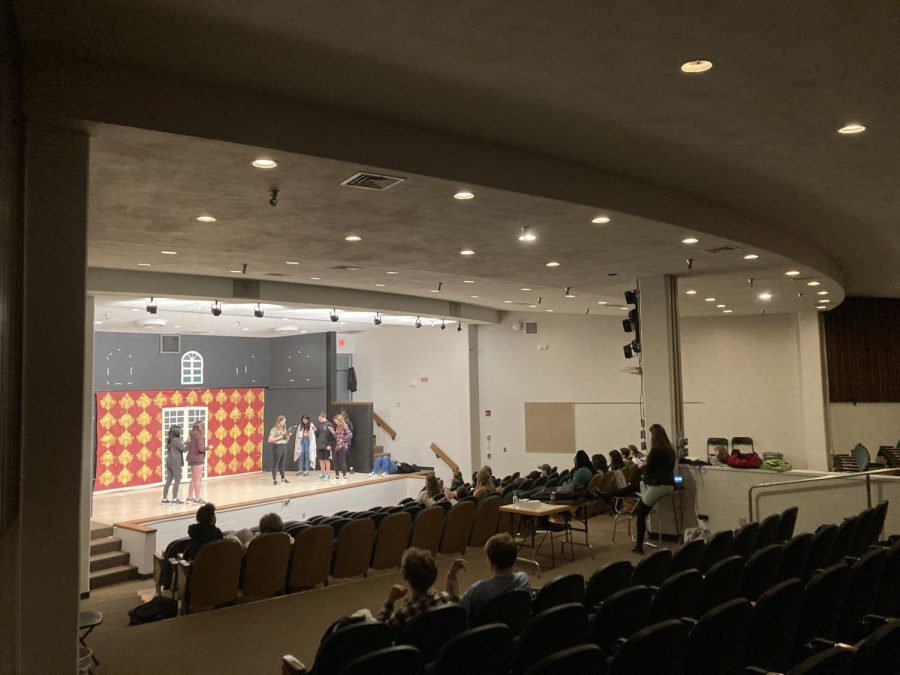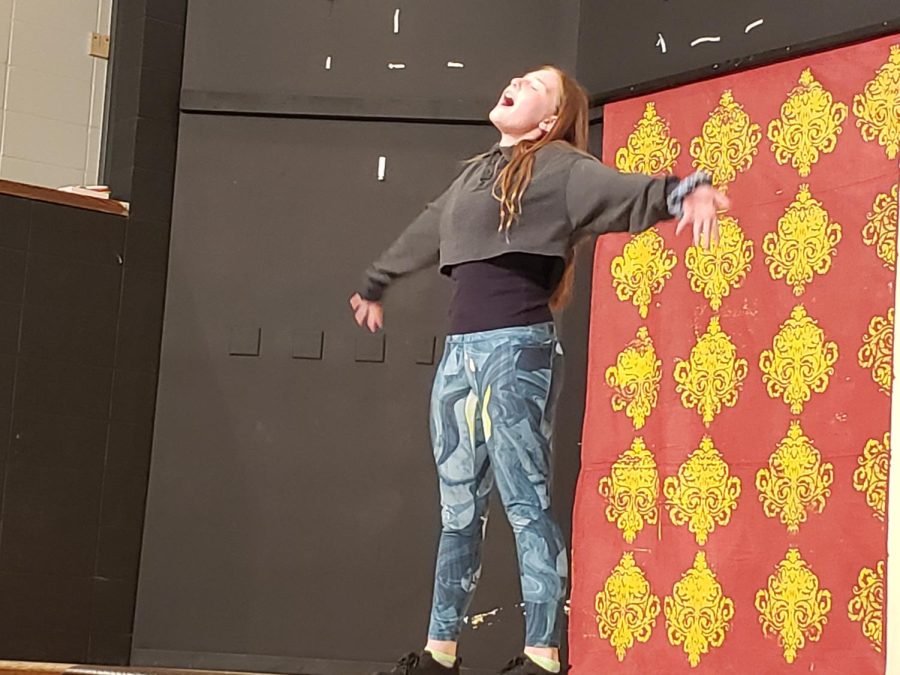The demolition of drama
WSS explores the demolition of the Northwest Junior High little theater and what it means for the drama programs in both middle and high school.
A group of NWJH students perform a skit in the little theater on May 1.
“The Crimson House Murder”
Act One, Scene One
SOUND EFFECT: Heavy Rain.
AT RISE: Main room of Crimson House, evening. The lights flicker and dim, giving a shadowy look to establish a mysterious mood.
It’s April 29, 2022, the opening night of Northwest Junior High’s production of “The Crimson House Murder.”
It’s the first production the drama program has done since the pandemic, and after months of hard work, both the cast and crew are excited to put on the show. The small theater in the center of the school is full of people, its small stage decorated to look like a 20th-century home.
But soon, the house will lie in shambles, taking the heart of the theater department with it.
The demolition
“I learned about [the demolition] moments before our play started for its Saturday night performance from custodial staff,” said Lauren Darby, last year’s director of “The Crimson House Murder” and the current director of the City High theater program.
It all started after the decision to move sixth grade into ICCSD junior high schools to make room for a Pre-K program in the district’s elementary schools. The junior high schools need to be larger to accommodate another grade, and decision-makers made plans to fit hundreds more students into the school.
“Northwest isn’t big enough to hold another grade of students. As the contractors and architects walked through the building, they noticed that the Little Theater was a huge area in that building. So they were asking questions about how often it is used, what’s it used for. It’s a lot of space that just isn’t being used, [only] once a year for the play,” said Elizabeth Breuning, last year’s principal of NWJH and current assistant principal of West High School. She said that the space was also occasionally used for things like study halls and speakers during the day, but the school needed to use it more for it to be cost-effective to keep it.
Choosing between the arts and saving money is always a difficult decision. Public schools are often underfunded, and due to recent legislation in Iowa giving money to families to send their kids to private schools, the issue of underfunding is not being solved. This means measures have to be taken to save money, and these decisions often lead to the arts receiving less money and resources, as seen in the case of NWJH theater.
“There’s no one that really seems to care enough about it growing, or how can we add on to other schools to have a space, or how can we replace this space?” Brooke Freund, the leader of Northwest’s drama program, said. She’s been doing what she can to keep the program alive as she has for the past ten years, working to figure out alternative ways to still put on productions despite the demolition.
Another reason for the demolition was that the other junior highs in the district don’t have a theater. “I was told it was “not equitable” for NWJH to continue to have a theater when North Central Junior High and Southeast Junior High did not have them, but building North Central without that space and getting rid of it at Southeast were intentional choices that were made, not a matter of inequitable resource allocation,” Darby said. Northwest was the only junior high school that would regularly put on productions. While the other schools occasionally have a drama club or elective, there isn’t an established theater program like NWJH has, according to Darby.
Due to the demolition, which will likely occur over the summer, the drama program can no longer put on productions at the school.
The impact
Without the theater, the drama department at NWJH will suffer a significant loss. “Theater is a particularly important space for students who don’t necessarily have another ‘home’ in the school,” Darby said. “At a time when there is a reported mental health crisis and need for investment in social-emotional learning, it is upsetting to feel that decision-makers in the district do not see, or even inquire about, the value of these programs.”
Darby isn’t the only one upset. Luke Reimer ‘27, who played a lead role in “Crimson House Murder” last year, also shared Darby’s sentiments. “I’m sure they wouldn’t tear down a football field, but they would tear down a theater, and we’re the only junior high that has a theater like that.”
According to Etta Graber ‘28, a member of NWJH’s drama club, theater provides a safe place for students to be themselves and try new things.
“Theater, for me, is a space to make new friends and have new experiences,” Graber said. “Watching a play is such an amazing opportunity to see how all these talented actors and singers and dancers perform, and a glimpse of the hard work they put into amazing sets and songs they sing, the directors and stage managers, just to have this little preview of all the effort that went on to make it possible. Being inside the production is even more amazing because you get to see all this first hand, and be a part of it, you meet these great people, and just really have a good time.”
Outside of play season, the drama club meets biweekly at the school. Freund runs the club and it provides an stress-free environment for students to learn about and participate in theater. Club meetings can consist of drama games, mini-performances and more. The theater is also used for the club, meaning they must relocate their meetings elsewhere in the school.
The productions
The last play done at the school was “The Crimson House Murder.” The play was about a hotel where its eccentric inhabitants pay incredibly high rent for lackluster service. And, of course, someone gets murdered.
Participating in the play allowed students to dip their toes in the theater pool, seeing what doing a production is like in a low-pressure environment. Most of those who participated had little to no experience with theater, and participating in the show let them experience drama while still having a lot of fun.
Aahana Gupta ’27, who played a journalism student, had a positive experience doing the show. “[Crimson House Murder] was extremely fun; I really liked it. I made a lot of friends and so many memories.”
But because the show was such a positive experience for those that were a part of it, knowing that that there might not be any more makes the demolition harder to bear. “[Crimson House Murder] kind of became like a second home, at least for a little bit, so it’s kind of like they’re tearing down a home,” said Reimer.
Participating in school theater isn’t the only way to participate in drama. The Iowa City area is very diverse and offers many opportunities, such as community theater. Organizations such as Young Footliters, a community theater program basic in Coralville, Iowa, offer camps and put on productions for young people. Some recent shows done by Young Footlighters include “Wings,” “Rudolph the Red-Nosed Reindeer Jr.” and “Jack and the Giant Beanstalk.”
Community theater is a great way to get involved with the world of drama. Young Footliters, for example, offers roles for all ages, allowing young children to participate in theater along with adults who are passionate about the arts.
While it is a great opportunity, doing camps and productions can take time and money. Only some have access to the transportation and money necessary to participate in community theater, generally making theater offered through school more accessible.
Community theater also tends to be more selective when it comes to casting for their productions. “It’s extremely difficult for kids to join the theater community from an older age like me, because we have no experience with previous productions, and are often not let in,” Graber said. “Drama club, on the other hand, is inclusive to everyone, and gives you a chance to be in a production regardless of skill and experience.”
The future
While no replacement plans for the theater are in place, the drama class and club will likely still exist.
But not having a theater does complicate some things.
“We have to move all of our theater equipment to the janitor’s closets, so we’re gonna be losing some things and we also just don’t have a space to do theatre things anymore,” Gupta said. Along with the theater, the costume closet and backstage area will no longer be accessible to drama students.
The lack of a theater at NWJH could also impact West High’s theater program. According to Theater West’s Director Katy Nahra, West High has a diverse theater program, with hundreds of students participating in each production, and those numbers rely on NWJH students’ exposure through the drama program there. Being able to put on shows at the junior high level exposes many of those students to drama and can ignite a passion for it.
“If you’re doing it early on, and you’re being encouraged to be creative in that way, that is so helpful,” Nahra said. “We think that Northwest has done just a fabulous job and Freund has done an amazing job with setting students up to be confident and feel like they can come here and audition or sign up to be part of our crew, and she’s given them all her students a place to create something together.”
Northwest is considering putting on plays at the Coralville Center for Performing Arts or in the gym. Doing productions at the CCPA would be a great option; it’s an amazing space. But, students can’t drive themselves, and not everyone can access transportation.
“They say they’re going to put stuff on in the gym, but I doubt that they’re going to be able to do that. The gym doesn’t have a podium or backstage area,” Reimer said. Without a backstage area, it’s hard to do set or costume changes or have a place for actors to be when not performing.
Now that the space has been taken away, the future of the drama program uncertain. Without a theater, the program lacks an area designated for it. The future now lies in decision-maker’s hands to give NWJH students the space to create and explore the performing arts.
Your donation will support the student journalists of West High School. Your contribution will allow us to purchase Scholarship Yearbooks, newsroom equipment and cover our annual website hosting costs.

Evelyn Kraber is a junior this year and the Managing and Features Editor for the website. Outside of journalism, they're a part of Theatre West and orchestra....

Anna Greenlee is a junior in her second year on staff. She's taking on three editor positions on top of her busy schedule with band, Theatre West and the...




